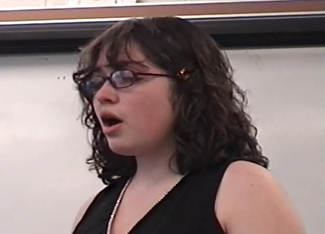May 11, 2021
When I was in elementary school, a group of boys would take over the back field every recess to play soccer. It was a strictly boys-only game, and it served as one of my earliest experiences with gender dysphoria. I loved soccer; I’d been playing on a team since I was 4. I tried to get in on the game multiple times, and every time I was told, “We don’t play with girls.”
I remember thinking, “But what does that have to do with me?” It would take another decade of learning and thinking to realize that I was a boy, not a girl like I’d been told all my life. This realization clarified many of my early experiences. The constant discomfort at being a Girl Scout, wishing I could join the Boy Scouts instead. Feeling deeply embarrassed when I was forced to change for gym in the girls’ locker room. Constant correction when I moved through the world in ways deemed not feminine enough.
As someone who hung out with mostly other outcasts, I always assumed that we felt excluded in similar ways. However, as we found spaces where we felt more comfortable (like high school choir) there was an element of longing for me that was different from my peers (in the case of choir, it was the constant wish to sing the tenor parts instead of alto, or to audition for boys’ solos).


I was different in ways I didn’t have words for. This led to being isolated in ways I didn’t know how to articulate, which made it impossible to close the gaps between myself and others. Transitioning, for me, allowed me to fully connect to those around me for the first time. It probably saved my life.
I transitioned during my college teacher preparation program. I was told by well-meaning professors and peers that I should reconsider a career as a classroom teacher. I was told that too many people would have a problem with a transgender teacher, and I would never get a job. I was told to make sure I could hide my transgender identity, so no one would ever know. Once, it was even suggested that I should “detransition” and live my entire life in the wrong gender in order to be a successful teacher.
This is the tension of being transgender in our current society. Are we being true to ourselves, or are we trying to fit ourselves into boxes that will allow us to move through society with the least amount of grief from cisgender people? In theory, transitioning should be a freeing act that allows us to align ourselves with our authenticity, not with external expectations. Reality, however, can be quite different.
In the 13 years since I came out as trans, transgender visibility in our society has skyrocketed. Thirteen years ago, getting to know me was, for some, the first time they had ever heard the word transgender. Now, celebrities like Laverne Cox, Caitlyn Jenner and Elliot Page have become household names. This rise in awareness has meant a similar rise in young people identifying as transgender. It isn’t that there are more of us; it’s that these young people have a name for what they are feeling, and they spend less of their lives confused and isolated like I was.
Unfortunately, this rise in visibility is a double-edged sword. For those who feel threatened by change, transgender people have become a flashpoint for suppressing those who don’t fit their ideas of acceptability. This is the latest in a long line of discrimination in the name of protecting the status quo. Every group that doesn’t fit has been subjected to a battle for their rights.
At time of writing, 31 states, including Michigan, have active bills attempting to exclude transgender youth from participating in sports. Like college-age me, these children are being asked to choose between an authentic version of themselves and participating in something they love.
Sports have long been a battleground for the growing pains of social change. In recent history, we’ve seen athletes like Jackie Robinson and Jesse Owens breaking color barriers in sports. We’ve seen countless women pioneering the way for female athletes, even as many of them are still paid significantly less than their male counterparts. Transgender athletes have been competing for decades without harming the successes of cisgender athletes.
The NCAA says these bills are “often ‘informed’ by hate and misinformation rather than science” and “inherently discriminatory.” These bills are another way of recycling an old argument for discrimination: that being American looks a certain way, and those who don’t meet these standards should be excluded or made to conform. As teachers, it is our job to make sure all students are included and safe to be their authentic selves.
I can’t tell you what it would have meant to me if a teacher had recognized my struggle as a child. If I had been encouraged to audition for tenor roles instead of alto ones, or allowed to play a boy in the school play. If I could have played on the boys’ soccer team instead of the girls’. I can only imagine the person I would have been without the isolation, anxiety and self-harm.
To those who told me I could not be transgender and a teacher: Not only am I a transgender teacher, I’m the 2020-2021 Michigan Teacher of the Year. I only hope this backlash against the transgender community will not stunt the possibilities for today’s trans youth.
 About Owen Bondono: I teach ninth grade English in Oak Park, MI. I am white, transgender, middle class, married, bi and able-bodied, and my pronouns are he/him/his. I acknowledge that everything I write is informed by the perspectives and privileges I have been afforded in life. As the 2020-2021 Michigan Teacher of the Year, I hope to learn from and advocate for all teachers and students in the state, with a focus on building and supporting a diverse teaching force.
About Owen Bondono: I teach ninth grade English in Oak Park, MI. I am white, transgender, middle class, married, bi and able-bodied, and my pronouns are he/him/his. I acknowledge that everything I write is informed by the perspectives and privileges I have been afforded in life. As the 2020-2021 Michigan Teacher of the Year, I hope to learn from and advocate for all teachers and students in the state, with a focus on building and supporting a diverse teaching force.